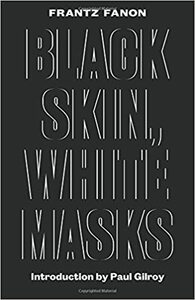Take a photo of a barcode or cover
The book is great, I'm just not in a good mental/emotional headspace to read it now. Maybe I'll come back to it in the future.
challenging
informative
inspiring
reflective
sad
slow-paced
dark
emotional
informative
reflective
medium-paced
challenging
informative
reflective
slow-paced
I felt exhilarated reading the introduction and the conclusion. Some of the middle part, not much so. (Mostly because I am not sure what novel he is reading and commenting on.) Many concepts that he puts forward (Black man as having dual consciousness and language, different racial dynamics between colonized subjects, the othering of postcolonialism that was never quite resolved...) were familiar from other readings, and I felt some of his observations are outdated (in a good way!), too. People who have read his book have changed his future that is today. For me, that is an encouraging sign to, as he suggests, also move forward in thinking about the future rather than belaboring on discovering/recovering the past.
AH so powerful! But also so many new questions!
AH so powerful! But also so many new questions!
challenging
reflective
slow-paced
challenging
informative
medium-paced
challenging
emotional
reflective
medium-paced
This was my first attempt at anything near contemporary-yet-foundational psychology, and presumably philosophy. Well, more accurately, my "first" attempt was Fanon's "Wretched of the Earth" which was just too dense for me at the time. That's why I sought this book, which came across as shorter and ultimately more direct in its thesis, thus more digestible for someone like my while also serving as a segue toward "Wretched." Indeed, it succeeded. This is a really enlightening read that gave me so much (needed) surface-level knowledge about psychology that I felt like I understood my own therapist's treatment toward me much better, even though, of course, I'm still not nearly at her level of expertise. To put it in laymen's terms I really felt like I just understood more of the "gist" of modern psychology than before. On top of that, I especially appreciated the repeated distinction that the neuroses and pathologies of oppressed and exploited people cannot be boiled down to individual ailments when there are genuine, real-life threats to their livelihoods: the oppressors and exploiters. Fanon really does due diligence to contrast this specific point to every other major psychological and philosophical assumption of his time. Even when he accepts and agrees with many diagnostic takeaways from his contemporaries, he is still able to provide evidence as to how such takeaways are incomplete by excluding the Black colonized peoples of his own studies. There are, of course, some outdated portions of the book, most obviously in the way that homosexuality is treated. I personally reminded myself that if anything, it at least helps to prove the book's value by showing how otherwise bold it was, for the time. However, that doesn't always make it easy to stomach. Furthermore, I can't pretend it's easy to read, but it's a scholarly translated text from the 1950's. Altogether I am impressed with the book and look forward to diving into "Wretched" next.
An absolutely astonishing work. Fanon develops fascinating perspectives on language, violence in Hegelian dialectics, the ability to "unconsciousize" experiences, the collective unconscious, and the psychology of masochism. Fanon is also an exemplary prose poet. I'm not averse to psychoanalysis, so that part of the book didn't bug me at all, but the stuff on rape is questionable and reveals Fanon's blind spot so far as women are concerned. On that account, it's certainly not a perfect text. But it nevertheless offers a great deal.
challenging
dark
emotional
informative
inspiring
sad
slow-paced








